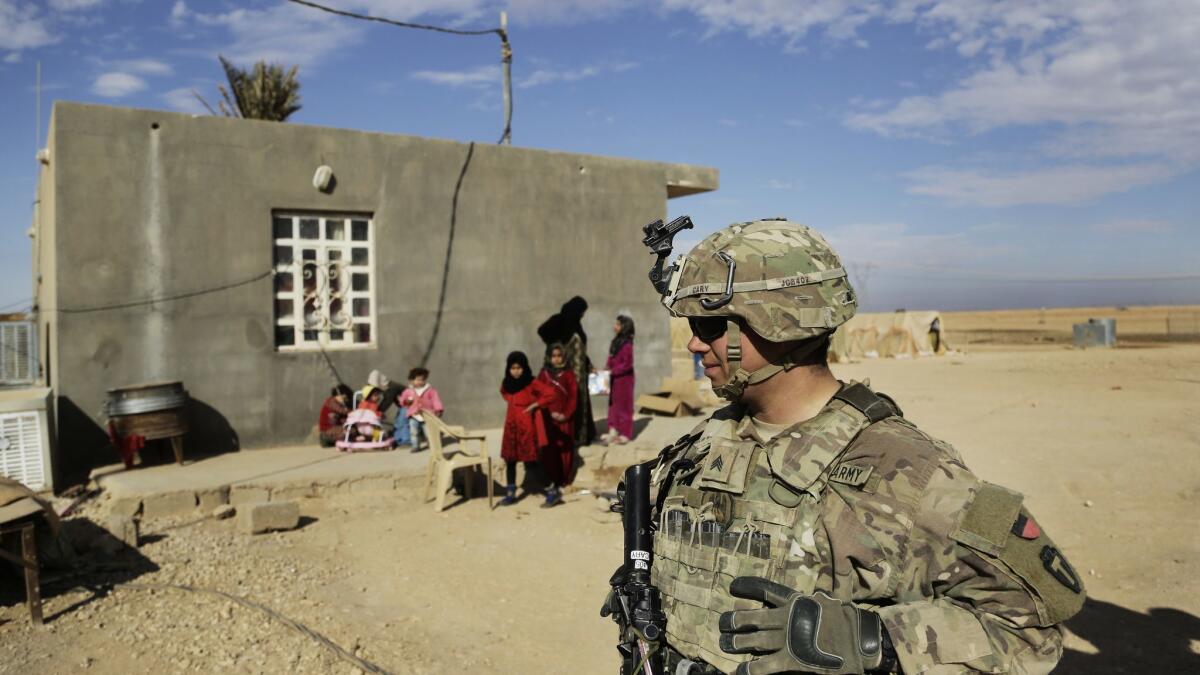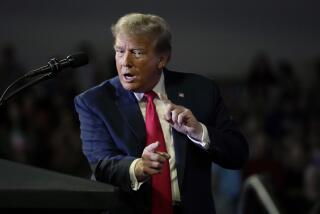Iraqi leaders reject Trump’s plan to use their country as a base against Iran

Reporting from Beirut — Iraq’s constantly squabbling politicians were united in umbrage Monday after President Trump said the United States would maintain a military presence in Iraq to keep an eye on Iran.
“Don’t overburden Iraq with your own issues. … Do not pursue your own policy priorities, we live here,” said Iraqi President Barham Salih at a forum in the Iraqi capital, Baghdad.
The rebuke was a response to Trump’s comments in an interview on CBS that he would keep U.S. personnel at Ain al Asad, a sprawling air base located some 100 miles west of Baghdad, to “[look] a little bit at Iran because Iran is a real problem.”
“We have a base in Iraq and the base is a fantastic edifice. I mean I was there recently, and I couldn’t believe the money that was spent on these massive runways,” Trump said. “It’s perfectly situated for looking at all over different parts of the troubled Middle East rather than pulling up.”
Trump’s comments come in the wake of his decision to withdraw U.S. troops from neighboring Syria, where some 2,000 soldiers as well as thousands more contractors have been helping a local Syrian Kurdish militia defeat Islamic State.
The extremists are on the verge of losing their final slice of territory, just west of the Iraq-Syria border.
When that happens, said Trump, those personnel would be redeployed to Ain al Asad. “They’ll be going to our base in Iraq, and ultimately some will be coming home,” he said.
Trump’s words angered many in Iraq, who resented the idea of their country being used as a launchpad against a neighbor — even one, such as Iran, that Iraq has fought in the past.
Since the United States attacked Iraq and overthrew dictator Saddam Hussein in 2003, Iraq’s fragile government has been buffeted between the U.S. and Iran; a recent study released by U.S. military leaders concluded that “an emboldened and expansionist Iran appears to be the only victor” of the U.S. invasion.
Though it once fought Hussein in a war that lasted more than seven years, Iran is today one of Iraq’s top trading partners while wielding considerable political influence. Along with the U.S., Iran is thought to have an unofficial “veto” over who gets chosen to lead Iraq.
Former Prime Minister Haider Abadi, a close ally of the United States, tweeted that “Iraqi sovereignty must be respected.”
His words were echoed by another former U.S.-supported leader, Ayad Allawi.
He tweeted that “Iraq wholly rejects foreign hegemony and becoming a fighting ground for external powers.”
Others took Trump’s remarks as yet another occasion to call for the expulsion of the 5,000 U.S. personnel stationed in Iraq.
Qais Khazali, leader of the League of the Righteous militia and a longtime U.S. adversary, said in an interview with local news broadcaster Sumariyah that “Trump’s recent statements reveal the truth of the American project in Iraq, that it targets neighboring countries.”
“Iraq has a parliament that can take the appropriate decision regarding American presence in the country,” Khazali said. “Iraq also has military institutions … and can expel U.S. forces from the country in a single night.”
More to Read
Sign up for Essential California
The most important California stories and recommendations in your inbox every morning.
You may occasionally receive promotional content from the Los Angeles Times.











